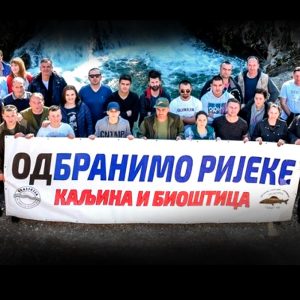On 23 June 2020, the Parliament of the Federation of Bosnia and Herzegovina voted a complete ban [1] on the construction of small hydropower plants (SHHPs) in the territory. In practical terms, this means immediate suspension of all new hydro-projects, and a chance to turn the tables on the exploitation of rivers and water across this Balkan State.
The conclusion represents a great victory for river-dependent communities and environmental associations [2], who have been campaigning to protect rivers and peoples’ right to water for many years. Real World Radio spoke to Redžib Skomorac, from Friends of the Earth Bosnia and Herzegovina, known locally as Centar Za Zivotnu Sredinu (Center for the Environment). He explained:
“After pressure from the local communities and the Coalition for the Protection of Rivers in Bosnia and Herzegovina, which is a coalition of a large number of NGOs in Bosnia, [the government] actually proposed this conclusion and it has been voted in favour. In practical terms, that means that any future or new initiative for small hydropower investments on the territory of the Federation of Bosnia and Herzegovina is suspended, at least for a period of three months. So, every river and creek should be safe in this period.”
More than 400 SHPPs are currently planned in Bosnia and Herzegovina, of which 100 have already been built. Hydropower plants have left riverbeds completely dry for much of the year, and threaten the livelihoods of river-dependent communities. The government rarely involves affected communities in decision-making, typically granting concessions to companies who will profit from water use, without seeking consent from those who live there.
“We had the situation where a lot of the communities and local people who will be majorly impacted by hydropower found out about the project only when the machinery is on the site, which is unacceptable. This is something our government now needs to change,” declares Redžib.
Centar Za Zivotnu Sredinu joins several organisations in the Coalition for the Protection of Rivers in Bosnia and Herzegovina [3], using activism (legal tools, blockades and public protests) to defend rivers, streams and creeks across the country. The recent Parliamentary vote was based on recommendations from their Declaration on the Protection of Rivers of the Western Balkans [4], first adopted in Sarajevo in November 2019. The Coalition is now ready to support the government to make it legally binding, and is hopeful that the ban will also be extended to Republika Srpska, the other entity of Bosnia and Herzegovina.
“I am kind of optimistic, yes, because we see this as a huge window of opportunity for all of us. The next steps will be to help the government to achieve this huge task. We as NGOs will demand an active role, not only advisory but actually an active role in this whole process, because we have the people with us,” said Redžib.
With a general election around the corner in Bosnia and Herzegovina, the public are waiting to see if this move is purely political play, or if it spells long-term, positive change for environmental policy and in Bosnia and Herzegovina.
“[The people] are actually positive, because we are shedding light on their struggles for years now. Finally they get acknowledged and there will be a huge push in their backs to protect the rivers even more now,” concludes Redžib.
